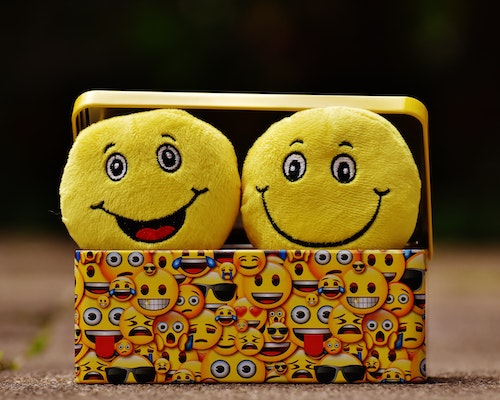
When we think of career success skills, how often do we put happiness on the list? Happiness is a skill and a choice, and according to Daniel Gilbert, a psychology professor at Harvard, happiness is the ultimate goal of virtually all the decisions we make in life.
To really be happy–which obviously translates to being more effective personally and professionally–we need to think of it as a skill we can continually improve upon. Here are a few simple rules to help increase our happiness quotient:
Rule Number 1: No one will behave the way we think they should—ever. This means people may drive 10 miles below the speed limit in the passing lane or forget to say hello when they pass us in the hall, or even miss our birthdays! Let it go. If we held on to every perceived injustice and every one of those angry memories was equal to a one-ounce weight, we could be bending sideways within a few days. Not to mention the amount of cortisol—that stress chemical—that would be coursing through our veins. Not a pleasant thought. Simply using the mantra—happiness is a skill and choice—is a great way to help us refocus. Misery is optional, and so is happiness.
Rule Number 2: Stop for Appreciation Breaks at least four times a day regardless of how important and busy and dedicated you are. You might even consider it mandatory for all those who work with you. Remember how much you have to be appreciative of, and spread the word. As a young woman I had a pretty rough time of it, and learned a great deal about the power and beauty of protecting my right to be happy. When I was a teenager (and pregnant) my husband was shipped off to Vietnam. Unfortunately, he was not good at managing money, so I woke up one morning in the apartment we had shared before he was drafted, to movers repossessing all our furniture. They looked at me and out of kindness left me a cot so I wouldn’t have to sleep on the floor. At least, I remembered thinking, I have something to be grateful for, I have something to sleep on! Much later when I finished my climb up Mt. Kilimanjaro my guide Kapanya took me to his home in Tanzia; he was so appreciative of his cinder block home with dirt floors and no indoor plumbing. We have so much. Just stopping to appreciate it during the day does wonders for clearing our heads of all the imagined small annoyances that can set us on a downward spiral of frustration and anger. Is anything really worth choosing to be upset?
Rule Number 3: Forgive Everyone. I know, this is where you quit reading, but wait, this also sounds a lot like Rule Number 1. It is different. You’re not just ignoring or letting go, you’re choosing specifically to stop being angry with someone for something. Doesn’t mean people deserve to be forgiven, but that’s not the point. Forgiving a boss, friend, relative and especially ourselves, opens up space and energy for more important things. This, of course, does not mean to ignore or accept bad behavior. But holding onto anger gets you more anger and negativity. Surrounding yourself with positive energy enables you to do a better job of everything in your day. One well-known business guru once said the most important thing anyone needs in the corporate world is a mental erasure.
Let me tell you a story of forgiveness. Back in the 90’s the Japanese were buying up parts of Rockefeller Center, and I happened to know the CEO of the Rockefeller Group, Dick Voell, at the time. There were some issues with how the negotiations were going, and one of his consultants gave Dick some very interesting advice. She told him to imagine all the Japanese business men who were part of the negotiating team in one large room. Then one by one to mentally forgive them of any perceived intent. In other words, stop being angry with them. He followed her advise and said it changed the entire dynamic of the situation, and the outcome was a win/win.
Rule Number 4: Pay Attention. Thoughts are sneaky! Get in the Sesame Street mentality or actually, the ELMO mentality. When you suddenly realize you’re worrying about something or angry with someone remember the ELMO acronym: Enough, Let’s Move On! Reverting back to worry is very different from strategizing how to solve a problem. Worrying sends us plummeting into despair, sadness apathy, or a number of other emotions we don’t need or have time for. And worry creates more worry; we need to pay attention to what we’re allowing in. You might even consider setting your phone to vibrate a few times each day just to check in on what you’re thinking.
Rule Number 5: Happiness Can Be Changed. Going back to 1929, Walter A. Pitkin wrote The Psychology of Happiness and said achieving happiness was not merely the result of luck or chance. It can be cultivated, enhanced, changed by our awareness and specifically paying attention to whether we’re allowing in more positive or negative emotions. Charles Duhigg, in his book The Power of Habit, reminds us that we are habitual creatures and with awareness our habitual thinking can be changed. Just realizing we can change how we process and think to get rid of anger and replace it with happiness, puts us way ahead of the game. And the more we model this control over our day, the more others will want to drink what we’re drinking, understanding all along that remaining happy—whatever that means to you—is not only possible, it’s attainable. And it will color every single aspect of our lives, making us more productive, more successful and oh yes, happier as well.


